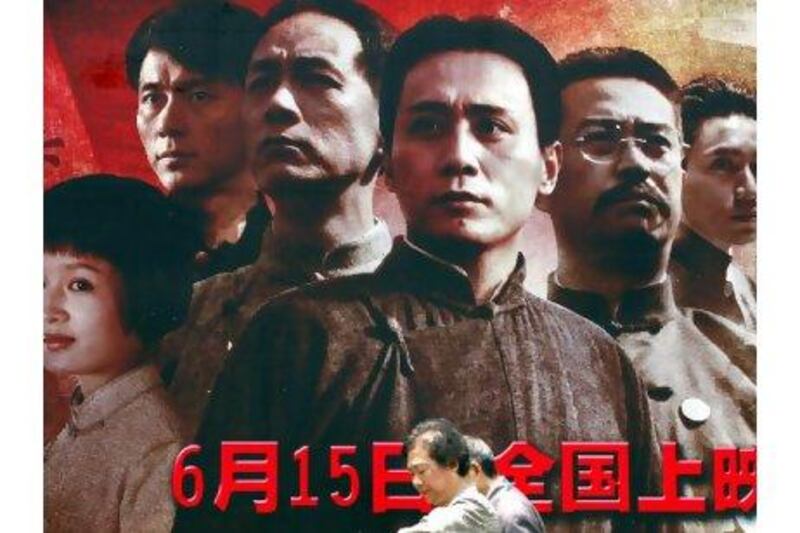To mark 90 years since it was founded, the Communist Party of China held a series of spectacular events in the past few weeks.
But perhaps the one that involved the most people was the release of the epic movie Beginning of the Great Revival, a historical extravaganza with about 180 A-list Chinese and Hong Kong actors.
Depicting the downfall of China's last emperor and the later formation of the Communist Party, the film is expected to gross at least 1 billion yuan (Dh568.1 million) at the box office.
While the film was almost guaranteed to be a hit at home, not least because cinemas have been screening it almost non-stop, some overseas critics have been less than impressed.
Writing in Canada's National Post, Manori Ravindran dismissed the movie as a "lame-duck epic" in which the "lack of storytelling" makes it seem "more of a history lesson" than a piece of entertainment.
It is not the first time such criticisms have been levelled at Chinese films preoccupied with recounting history through the prism of political ideology.
"China used to be a socialist country and compared to western and Hong Kong [cinema], the films are not primarily for entertainment.
"They are primarily for propaganda or entertainment," says Dr Lo Wailuk, an associate professor at the Academy of Film at Hong Kong Baptist University.
"It's only recently that Chinese films have developed this entertainment dimension."
Given some Chinese films still appear to be more about propaganda than entertainment, it is no surprise Hollywood is grabbing an increasing share of box-office takings in the country, which analysts say is the world's fastest-growing cinema market.
US films grossed 44 per cent of the 10.2bn yuan taken in China last year, much of it for James Cameron's Avatar. And it is not hard to find young moviegoers who would rather watch a Tinseltown blockbuster than a home-grown epic.
"I usually prefer to watch Hollywood or western movies because they look real. The stories are realistic - they are not fake stories," says Su Chang, 25, a saleswoman who lives in Beijing and is a regular film-goer.
It is mainly young people who prefer Hollywood's offerings.
"Most of the older generation, because of the culture shock, cannot accept the foreign lifestyle, so they're not interested in Hollywood movies," she says.
Dr Lo goes further and says the Chinese love affair with Hollywood stems from the country's new economic status.
"The individualism, as reflected in western films, is what the younger generation is developing when they were growing up in the 1990s and 2000s," when China emerged from the economic shadows, he says.
"They have no difficulty understanding western films."
Transformers 3 had its Chinese release date put back so the film would not compete with the Beginning of the Great Revival.
The Hollywood blockbuster has already racked up huge ticket sales in the US and overseas, and interest in China has been no less frenzied.
Li Yi, 18, an interior designer also based in Beijing and who goes to the cinema regularly, admits he loves to watch films such as the Michael Bay-directed action feature.
"The Transformers movies are science fiction and I like this kind of film," he says. "Chinese films, at the very beginning, you can guess the result. In Hollywood movies a lot of unexpected things happen."
Although US films are hugely popular with Chinese audiences, Hollywood faces a major hurdle before it can achieve in China the kind of dominance it has secured in other major markets overseas.
Each year a maximum of 20 foreign films are allowed full distribution, much to the chagrin of the Motion Picture Association of America.
While China was supposed to have eased these restrictions earlier this year to comply with a World Trade Organization ruling, the quota still remains.
Even if these restrictions are lifted, Dr Lo believes "the Chinese government will do something" to prevent Hollywood from flooding the market place.
Yet despite the quota-system, Hollywood is still making inroads at the Chinese box office because the cinema industry is growing at such a fast pace.
According to the China Film Producers' Association, by 2015 box-office receipts are likely to reach close to 40bn yuan annually, four times the current figure.
Since cinema revenues were up 64 per cent last year compared with 2009, this level of growth seems well within reach.
Such is the growing importance of the Chinese market Hollywood film-makers are already tailoring their features to audiences in the country.
Last year's remake of The Karate Kid used Chinese martial arts instead of Japanese as in the originaland was set in China. Jackie Chan, a major star in the country, was one of the leads.
Just as Hollywood is taking China increasingly seriously, so Chinese film-makers are starting to consider foreign markets when they create their features.
The forthcoming The Heroes of Nanking, directed by the Chinese film-maker Zhang Yimou, has almost half its dialogue in English and stars Christian Bale, the Hollywood A-list actor.
While countless previous Chinese blockbusters have bombed overseas - Beginning of the Great Revival does not even have a US distributor - The Heroes of Nanking is expected to be a major hit.
Zhang's epic tells the story of the Japanese invasion of Nanking in 1937 and the brutal repression that followed.
Still, Dr Lo believes Chinese films have a long way to go to grab a crucial share of the global market because there are too many cultural barriers.
Instead, Hollywood will remake Chinese classics that appear to have worldwide appeal.
"Hollywood studios want to transform [successful Chinese films] to their own product. They reinvent it," he says.
business@thenational.ae
Hollywood reels in Chinese market
China's film industry is struggling to compete with Hollywood's block-busters

Editor's picks
More from the national





